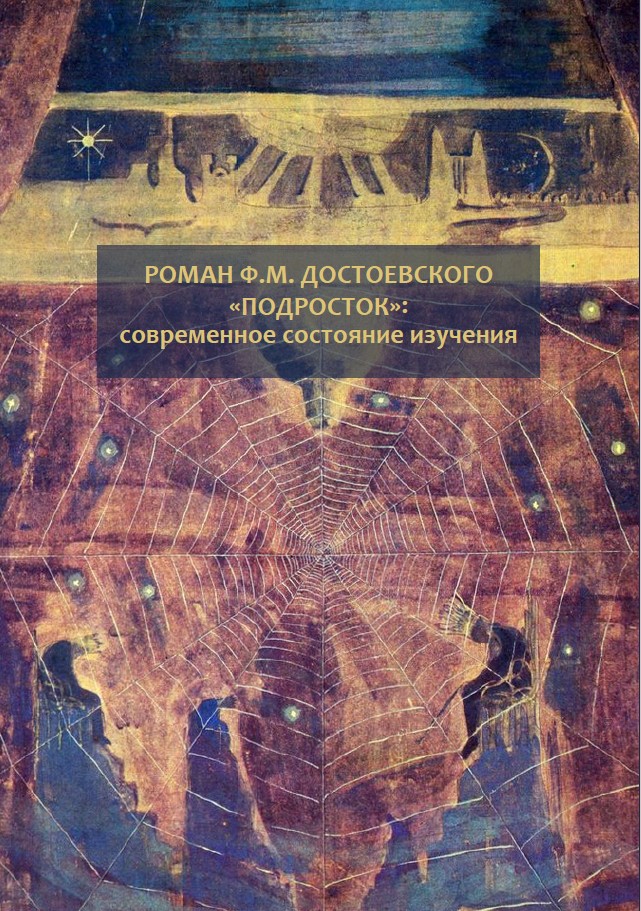About editor-in-Chief:
Tatiana A. Kasatkina, DSc in Philology, Director of Research, Head of the Research Centre “Dostoevsky and World Culture”, A.M. Gorky Institute of World Literature of the Russian Academy of Sciences, Povarskaya 25A, bld. 1, 121069 Moscow, Russia.
https://orcid.org/0000-0002-0875-067X
E-mail:
Abstract:
The third book in the series Dostoevsky’s Novels: Current State of Research is dedicated to the novel The Adolescent and it is published in collaboration with scholars from different countries; the first book was devoted to the novel The Idiot (Moscow, Naslediye Publ., 2001), the second to the novel The Brothers Karamazov (Moscow, Nauka Publ., 2007). The book analyses the problems of a personality experiencing the process of formation, and the narrative structure of the novel that enables the author to express his complex philosophical and theological ideas through the speech of the adolescent hero; it explores the relationship of drafts to the published text, the system of allusions, reminiscences, direct and latent quotations which introduces sacred, literary, pictorial, and musical texts of European and Russian culture in Dostoevsky’s text; it provides an analysis of different performances of the novel, etc. Analytical reviews of research on the novel in the 20th and 21st centuries in Russia and abroad are published. The book is meant for readers who love Dostoevsky, as well as philologists, philosophers, and theologians.
Keywords: Dostoevsky, The Adolescence, poetics, hermeneutics, textual criticism, reception, research reviews, quotation, reminiscence, Book of Job, history of the House of David, Gnosticism, Rothschild, Goethe, Dickens, Voltaire, Heine, Gounod.
CONTENTS
Preface (Tatiana Kasatkina)
HERMENEUTICS. POETICS
Tatiana Kasatkina.
Dostoevsky’s Novel The Adolescent
The “Idea” of the Hero and the Idea of the Author
Two Images of the Sun
Punctuation as an Artistic Tecnique: “Only Opening Quotation Marks”
The Icon in Words at the End of the Novel
The Image of Versilov from the Point of View of Emotional and Value Orientations
The Book of Job in the Novel: Pointless Sufferings and Theodicy
“Where Does He Live?”: The Question about the Abode of God in the Novel
Tatiana Magaril-Il’iaeva. Voltaire’s Comedy The Prodigal Son in Dostoevsky’s Novel The Adolescent
Inna Gazheva. “I Don’t Like Sunsets”: The Semantics of the Symbol of the Sunset in Dostoevsky’s Novel The Adolescent
Elena Stepanyan-Rumyantseva. The Adolescent: A Novel of Vision
Olga Meerson. The Adolescent as a Sentimental Education
Yuri Corrigan. Arkady the Deathless (Dostoevsky on the External Soul)
Maria Candida Ghidini. Confession and Writing in Dostoevsky’s Novel The Adolescent
Tatyana Kovalevskaya. Money and Personality. Notes from the House of the Dead, The Gambler, The Adolescent
Nikolay Podosokorsky. The Legend of Rothschild as the “Napoleon of Finance” in Dostoevsky’s Works
Tatiana Boborykina. No Longer an Adolescent, Not Yet a Prince
Anastasia Gacheva. “Restoring the Kinship”: The Novel The Adolescent as a Prologue to the Dialogue Between Nikolay Fedorov and Fyodor Dostoevsky
Olga Bogdanova.
The Problem of Beauty and Female Characters in Dostoevsky’s Novel The Adolescent
“Living Life”
“Last Angel”
Marina Shalina. On the Question of “Living Life” in Dostoevsky’s Novel The Adolescent
Svetlana Kapustina. The Concept of “Besporyadok” (“Disorder”) in Dostoevsky’s Novel The Adolescent
Tatyana Kovalevskaya. Charles Gounod’s Faust and Dostoevsky’s Artistic Principles
TEXTUAL CRITICISM AND THE CREATIVE HISTORY OF THE TEXT
Natalia Tarasova.
Textual Aspects of the Research on the Novel The Adolescent
Dostoevsky’s Creative Diaries
From Graphics to Biography and Art: A New Name in the Drafts for the Novel
Semantics and Ideography of Conventional Signs in the Drafts for the Novel
Allusion and Reminiscence in the Drafts of the Novel: (Vasily Zhukovsky’s Elegy A Country Churchyard)
The Image of the Sunset in the Novel: Dostoevsky and Dickens
Intermedial Links in the Novel: Icon — Painting — Church
The Faustian Scene in the Novel: Literary and Musical Aspects
Viktor Dimitriev.
Children Stories in The Adolescent by Fyodor Dostoevsky: from the Drafts to the Novel
Once More on the Reason Why the Scene with Arisha Was Discarded The Story of the “Boy with the Bird” in the Making of the Novel
THE ADOLESCENT: BIOGRAPHICAL CONTEXT, REAL COMMENTARY
Yulia Yukhnovich. The Theme of Lawyers in Dostoevsky’s Novel The Adolescent
Valentina Borisova, Sergey Shaulov. The Adolescent. Realia and Historical-Literary Commentary
CINEMA. THEATRE
Liudmila Saraskina. Arkady Dolgoruky in Cinema and Theatre: Debut Decisions
THE ADOLESCENT IN RESEARCH, PREFACES, TRANSLATIONS. REVIEWS
Olga Bogdanova.
Fyodor Dostoevsky’s Novel The Adolescent in the Research of Russian Authors of the First Half of the 20th Century: An Analytical Review
Reception of The Adolescent in 1900–1910s
Reception of The Adolescent in 1920–1940s: General Overview
Religious and Philosophical Reflection on The Adolescent in 1920–1940s
The Novel The Adolescent in the Studies on Dostoevsky’s Biography during 1920–1940s
Psychoanalys and the Novel The Adolescent in 1920s
Poetics and Textual Criticism of The Adolescent in Research during 1920–1940s
a) History of the Research on the Manuscripts for The Adolescent
b) Research on Poetics and Textual Criticism
of The Adolescent in USSR in 1920s
c) Russian Emigration on the Poetics of The Adolescent in 1920–1940s
d) Research on the Poetics of The Adolescent in USSR during 1930–1940s
Conclusions
Tamara Kudryavtseva. The Novel The Adolescent by Fyodor Dostoevsky: Academical and Critical Reflection in German-Speaking Countries (19th–21st Centuries)
Caterina Corbella. The Italian Reception of Dostoevsky’s Novel The Adolescent
Valentina Borisova. Dostoevsky’s Novel The Adolescent in Contemporary Research



